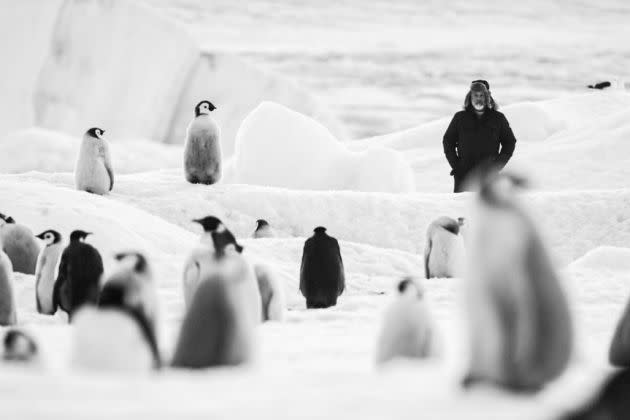‘Antarctica Calling’ Review: Luc Jacquet’s Latest Feels Like a Feature-Length Selfie, With the South Pole Over His Shoulder
- Oops!Something went wrong.Please try again later.
- Oops!Something went wrong.Please try again later.

Nearly two decades ago, “March of the Penguins” crossed a frontier hardly any nonfiction film ever does: not just the Antarctic Circle, but the even more remote $100 million mark at the global box office. A bona fide global phenomenon, Luc Jacquet’s wondrous nature doc got audiences from practically every continent to turn their attention to the South Pole and the adorable, surprisingly relatable emperor penguins its director found there. (Even before “Happy Feet” and Werner Herzog’s “Encounters at the End of the World,” this was the start of penguin mania at the movies.)
The focus of “March” (and its 12-years-later sequel) was the 100-kilometer trek these remarkable black-and-white birds do between their mating grounds and the water. What undeniable force compels them to make that journey? In “Antarctica Calling,” it’s a different but no less irresistible urge that fascinates Jacquet: specifically, the almost-magnetic pull that draws the French filmmaker back to the South Pole time and again. He’s been coming since he was 23 years old. Now in his mid-50s, Jacquet re-returns, and it’s the whole film, not just the penguins, that’s black and white — a striking choice that puts practically every high-contrast, high-definition frame on par with a Sebastião Salgado photograph.
More from Variety
There’s just one problem. Think back to “March of the Penguins.” What’s the No. 1 thing you remember about the movie? It’s probably not the visuals, but the mellifluous sound of Morgan Freeman’s narration. And one thing American audiences may not realize: In Jacquet’s original French-language version, it was the penguins who told their own story. The film was re-edited and dubbed in order to become the Oscar-winning marvel the world embraced.
While unassailably gorgeous, the discursive and oddly self-indulgent cut of “Antarctica Calling” that premiered at the Locarno Film Festival feels like the “before” version of a better, more audience-friendly movie. But will Jacquet agree to alter what feels like a feature-length selfie, in which the director plonks himself in frame for a great many of the shots and then waxes poetic over the remaining images? “All that remains is a wild peace that overwhelms me,” he opines. Where’s Herzog’s austere Teutonic philosophizing when you need it?
If Jacquet means his movie to be about how he keeps heading in the counterintuitive direction — toward what Lovecraft called “the Mountains of Madness” — then it’s not an image from “March” that springs to mind so much as that indelible image from “Encounters” of the renegade (and possibly insane) penguin waddling away from the flock. Jacquet could be that same odd bird. But listening to him muse about the source of what draws him to Antarctica isn’t nearly as compelling as a more conventional voiceover might have been, the sort where our host tells us what he’s observed and learned over multiple trips.
This time around, Jacquet starts out in Patagonia, where he films the wildlife while also allowing himself to be filmed, reaching out a compassionate hand to caress the blackened trunk of a tree badly injured by wildfires. Then comes a very long ship ride. The way editor Stéphane Mazalaigue assembles the footage, privileging abstract and unconventional images, it’s not always clear where we are. Right around the half-hour mark, Jacquet reaches the Great South. He shares his obsession with Magellan and so many other explorers who came before, incorporating pages from their journals. This film is Jacquet’s journal, and though the images and musical score are outstanding — even if there’s not nearly enough penguin footage to justify the price of admission for most — the words underwhelm.
No one watches Jacques Cousteau movies hoping to find the oceanographer questioning what he loves about the deep. In this case, Jacquet’s drawn-out, quasi-analytical inquiry can’t help but spark audiences (at least those who’ve accompanied him before) to ask why they also keep coming back for more.
Best of Variety
Sign up for Variety’s Newsletter. For the latest news, follow us on Facebook, Twitter, and Instagram.
